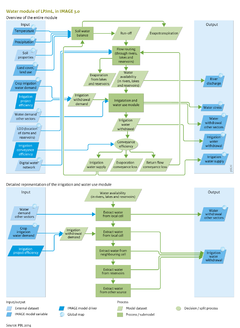Water/Description: Difference between revisions
< Water
Jump to navigation
Jump to search
No edit summary |
No edit summary |
||
| Line 38: | Line 38: | ||
====Impact indicators==== | ====Impact indicators==== | ||
Water stress is often presented as a spatially and temporally averaged water withdrawal-to-availability ratio, typically at basin or country level. The amount of people living under water stress is estimated by overlaying a water-stress map with one of population density. Those indicators are used to present IMAGE-LPJmL results (e.g. in the [[OECD Environmental Outlook | Water stress is often presented as a spatially and temporally averaged water withdrawal-to-availability ratio, typically at basin or country level. The amount of people living under water stress is estimated by overlaying a water-stress map with one of population density. Those indicators are used to present IMAGE-LPJmL results (e.g. in the [[OECD Environmental Outlook to 2050 (2012) project|OECD Environmental Outlook (2012)]], see figure on the left) but they mask the potential occurrence of water shortages on a short-term or sub-basin scale. Therefore, water stress should also be calculated at higher spatial and temporal resolutions (see e.g. [[Biemans, 2012]]). | ||
The impacts of water stress differ per sector, but the above described indicators do not provide insight into those impacts. Apart from the general water stress indicators, the model also considers production reductions in irrigated agriculture due to limited water availability as an indicator of agricultural water stress ([[Biemans, 2012]]). | The impacts of water stress differ per sector, but the above described indicators do not provide insight into those impacts. Apart from the general water stress indicators, the model also considers production reductions in irrigated agriculture due to limited water availability as an indicator of agricultural water stress ([[Biemans, 2012]]). | ||
}} | }} | ||
Revision as of 09:15, 31 January 2014
Parts of Water/Description
| Component is implemented in: |
|
| Related IMAGE components |
| Projects/Applications |
| Key publications |
| References |
